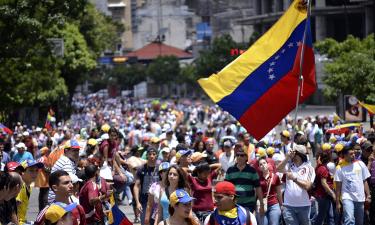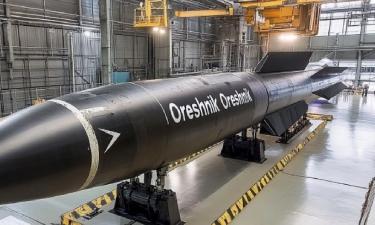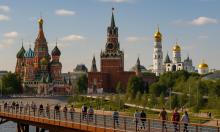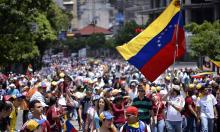Red Flag Over the Reichstag
"The great sacrifices made by the Soviet people in WWII for the sake of victory were not in vain"
On the eve of the 53rd anniversary of Victory Day (in 1998). a journalist with Russia's Pravda newspaper talked to legendary Soviet battalion commander  Stepan Neustroyev, a man who participated in raising the Soviet flag over the Reichstag in 1945. The journalist congratulated the veteran on the publication of his book Russian Soldier: On the Path to the Reichstag which had added to telling the truth about WWII. Stepan Neustroyev looked hale and hearty at his age of 75. Unfortunately, he never read the interview published in the newspaper, as the Soviet hero died soon thereafter. Although heroes die, their deeds and examples survive.
Stepan Neustroyev, a man who participated in raising the Soviet flag over the Reichstag in 1945. The journalist congratulated the veteran on the publication of his book Russian Soldier: On the Path to the Reichstag which had added to telling the truth about WWII. Stepan Neustroyev looked hale and hearty at his age of 75. Unfortunately, he never read the interview published in the newspaper, as the Soviet hero died soon thereafter. Although heroes die, their deeds and examples survive.
Stepan Neustroyev was a working man who dreamed of flying in the sky, but his fate was to serve in the infantry. He entered the war in January 1942 in the bloody slaughter near Staraya Russa and ended it in Berlin in May 1945.
When I read your book about the glorious days of this country, I once again understood that, if a soldier knows for what he is fighting, he is invincible. Why do you think the Soviet army was at the Volga River in WWII, and now the Russian army still cannot settle the Chechnya problem?
I would like to speak about Chechnya first. The war in Chechnya, as well as hostilities in other regions of the former Soviet Union, couldn't develop according to any other scenario. This is a war against the country's own people with definite purposes that are realized by a generously paid "fifth column." The popular slogans such as "Democracy YES, Soviets NO!" and "Destroy socialism, Build up people's capitalism!" are popularized by the fifth column and they use them as a disguise. So, we see the consequences of these actions. The army is brought to shame, and a majority of Russians are living in poverty. The situation was quite different in the 1940s. Do you think it would have been possible to win WWII if the situation had been so sad at that time?
It is difficult to say what might have happened to the Soviet Army if it hadn’t had the home front of moral and political unity of the Soviet nations, successful work and readiness for self-sacrifice for the sake of common well-being typical of all Soviet people. Remember the ancient formula: we would die if we were not dying in struggle?
What do you think was your hardest moment during WWII?
The Demyanskaya operation on the Northwestern Front was the hardest moment. Although it seriously damaged the German army, the outcome of the operation wasn't a success. That was a terrible time; even the operation in Berlin cannot be compared with it. That was the triumph of Soviet strategic skills and the military valor of the Soviet army. Encirclement of the German capital ended on April 25, 1945. My battalion in the 3rd shock division commanded by Colonel-General Kuznetsov rushed to the center of Berlin. On April 30, the battalion seized Himmler's house and reached the square where the Reichstag, the symbol of German Fascism, stood. At that very moment, Soviet soldiers were informed that the Army War Council had sent in nine red Victory Flags.
Why was the number nine?
This is because the number of Army divisions was also nine.
The center of Berlin had amassed lots of technical units and many soldiers. Those were elite German SS units. Our battalion was right opposite to the Reichstag at that time. The building was stormed by the battalion of Major Davydov from the right and by battalion of Senior Lieutenant Samsonov from the left. There were just 300 meters remaining to reach the Reichstag. But the distance was an open area fired upon from every side. Together with Alexey Berest, the officer responsible for the political training of the battalion, we sent soldiers in one attack after another, but retreated each time. Two battalions on our side were also attempting to attack the Reichstag unsuccessfully. All the same, we carried out the order to seize the Reichstag building. It was on only the fourth attempt that our battalion rushed into the Reichstag at about 6:00 p.m. on April 30. We started hand-to-hand fighting with SS soldiers and the combat lasted till late hours. By midnight, the fight was fading away. As far as I understood, Hitler's troops had descended to some underground rooms. And we had a chance to catch our breath. We organized an all-round defense. All of a sudden, two guys from the regimental reconnaissance, Sergeant Yegorov and Junior Sergeant Kantaria came up with a Victory Flag.
Did you know the two guys?
They were brave guys. Regiment Commander Colonel Zinchenko introduced the guys to me and told they were given the honor to raise the Soviet Flag over the Reichstag. Then the colonel gave the order to raise the flag and the sergeants saluted and disappeared into the darkness. It was very dark inside the building, and the guys had no flashlights. They came back in a few minutes. I ordered Alexey Berest to take a squad of submachine-gunners and escort the sergeants. The agonizing suspense lasted for minutes, but it seemed we had to wait for hours. Suddenly, we heard a grenade blast and a burst of machine-gun fire. The whole of the battalion was ready to rush upstairs, but suddenly everything calmed down. In about half an hour, Yegorov and Kantaria got back smiling together with the whole squad of submachine-gunners safe and sound. Alexey Berest said that the guys fastened the flag to bronze horses, to a statue on the top of the building, with their belts so that the Soviet flag could wave there for a long period of time.
But the war wasn't over right at that moment, right?
At dawn, the field kitchen delivered breakfast to us. However, we didn't even touch the meals. The Germans saw the Soviet flag streaming on the top of Reichstag and got incredibly mad. They started counter-attacks to drive the battalion out of the building. We thought the battalion could be killed. The battalions of Samsonov and Davydov came to our rescue. Fortunately, they had stayed outside the Reichstag.
Do you mean the Germans were still holding the line?
Yes, they had hunkered down in the building. That was a trap for them, as we blocked all the exits. The enemy was violently fighting, but Germans asked to start negotiations on May 2. The negotiations were held in the semi-basement where the Germans were. I saw SS soldiers with their faces violent with hatred and weakness. Some of them held their guns at the ready. Our composure and assurance prevailed in that situation. The negotiations were a success; the Germans hoisted a white flag at 7:00 a.m. and left the building one by one following our instructions.
The battalion stayed in the Reichstag till May 10. We celebrated Victory Day there. Before the celebration we met with Soviet Marshall Georgy Zhukov. Then we took part in the Victory Parade in Moscow. I got back home to the Urals on New Year's Eve in 1946. I was invited for to work in the Department of Internal Affairs. I was in command of strategic nuclear industry infrastructure. I retired in 1962 and moved to Kuban with my family. My life was sometimes very hard in Ukraine after Perestroika. War veterans were treated awfully there at that time. It might happen that I had no money to buy bread. The situation was very difficult. All the same, I am sure that the great sacrifices made by the Soviet people for the sake of victory were not in vain.
The veteran was interviewed by Yuly Semenenko
Subscribe to Pravda.Ru Telegram channel, Facebook, RSS!




